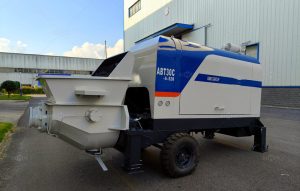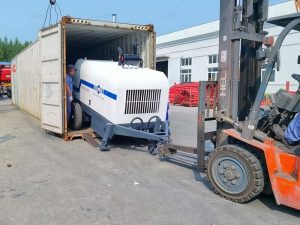When consulting a concrete pump broker about acquiring a trailer concrete pump for operations in hot climates, several critical technical and operational factors must be evaluated to ensure optimal performance, durability, and cost-efficiency. Unlike standard environments, high-temperature regions impose unique challenges on concrete pumping equipment, from hydraulic system stability to material flow consistency. A well-informed discussion with your broker should cover the following key parameters to guarantee you select a machine capable of withstanding extreme heat while maintaining productivity.

Heat-Resistant Hydraulic System Specifications
The hydraulic system is the backbone of any trailer concrete pump, and in hot climates, excessive heat can lead to fluid breakdown, increased wear, and system failure. When speaking with your concrete pump broker, verify whether the pump’s hydraulic oil cooling capacity is sufficient for sustained high-temperature operation. Look for models equipped with oversized radiators or auxiliary cooling fans to prevent overheating. Additionally, inquire about the recommended hydraulic oil viscosity grade—opt for high-temperature-resistant fluids (ISO VG 46 or higher) that maintain lubrication properties even under thermal stress. Some advanced systems feature automatic temperature modulation, adjusting flow rates to prevent overheating during prolonged use in scorching conditions.
Engine Performance and Cooling Efficiency in High Temperatures
Since trailer concrete pumps rely on either diesel or electric power sources, their engines must be evaluated for heat tolerance. Diesel engines, commonly used in remote job sites, should have turbocharged intercooling systems to combat power loss in hot weather. Ask your concrete pump broker about the engine’s derating factor—a specification indicating performance loss at elevated temperatures. For electric-powered units, ensure the motor insulation class (preferably Class H) can endure continuous operation in heat without premature failure. Moreover, confirm whether the cooling system includes high-capacity heat exchangers or liquid-cooled components to maintain optimal operating temperatures.
Concrete Mix Adaptability and Pipeline Cooling Measures
In hot climates, concrete tends to set faster, increasing the risk of pipeline blockages. A reliable trailer concrete pump must accommodate retarder-admixed concrete or feature pipeline cooling systems to slow hydration. Discuss with your broker whether the pump supports wet priming (using water to lubricate pipes before pumping) or automated pipeline flushing to prevent material buildup. Additionally, verify the maximum aggregate size and slump range compatibility—hot weather mixes often require adjustments, and your pump should handle varying consistencies without clogging.
Structural Durability Against Thermal Expansion
Repeated exposure to high temperatures can cause metal fatigue in a trailer concrete pump’s framework and pipelines. Ensure the broker provides units constructed with heat-treated steel or aluminum alloys that resist warping. Critical components like S-valves, cylinders, and wear plates should be made of abrasion-resistant materials (e.g., hardened chromium steel) to withstand both heat and mechanical stress. Furthermore, inspect the pipeline coupling system—heat can loosen standard fittings, so models with thermal expansion-compensating seals are preferable.
Mobility and Site Adaptability in Arid Conditions
Unlike stationary pumps, a trailer concrete pump must be easily relocatable across dusty, uneven terrains common in hot regions. Confirm with your broker that the trailer’s suspension system is robust enough for off-road use, featuring heavy-duty axles and heat-resistant tires (rated for high-load, high-temperature operation). If the pump will be used in desert environments, inquire about sand filtration systems for the engine and hydraulics to prevent particulate damage.
After-Sales Support and Heat-Specific Maintenance Plans
A reputable concrete pump broker should offer tailored service agreements for hot-climate operations. This includes frequent coolant system inspections, heat-resistant spare part inventories, and emergency repair protocols for overheating-related failures. Request documentation on mean time between failures (MTBF) under high-temperature conditions and whether the manufacturer provides thermal stress testing reports for the model you’re considering.
Purchasing a trailer concrete pump for hot climates demands meticulous scrutiny of heat-related performance parameters. By addressing these factors with your concrete pump broker—from hydraulic cooling efficiency to material durability—you can secure a machine that delivers reliability despite extreme temperatures. Always prioritize suppliers who understand regional challenges and offer customized solutions, ensuring your investment remains productive in the long term.

Leave a Reply